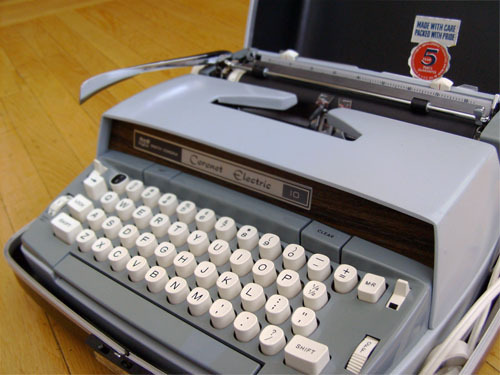Tool for the Tentative Writer

This is my 1976 Smith-Corona typewriter. My dad gave it to me recently after he helped clean out a friend's house, and my plan was to use it when November rolled around. I have mixed feelings about owning a typewriter, but the dominant feelings are ultimately love and guilt. I feel guilty, of course, because it's liking something for the nostalgia of it. Something from the mid-70s is so novel and fresh nowadays, and I can see my poetry professor rolling his eyes at me, thinking about the days when students used typewriters because they didn't have anything more awesome, like the internet. Mostly I feel guilty because now I can legitimately be called a hipster. My dreams whisper the accusation to me while I sleep at night. One thing to know—this kind of guilt is best quelled by rolling over and sleeping some more.
I love it because of the way it sounds. It's loud. As I type, I can feel the force of each letter being smacked down onto the page, like, "Ha! I just wrote a 'G'! What do you have to say about that?" A desktop keyboard's noncommittal clickety-clicks are no match for my Smith-Corona, where each stroke sounds decisive. And even when I make a mistake (which, believe me, there are many), I somehow put faith in the typewriter's ability to see me through to the end. It emits a low rumble when it's plugged in, drowning out any distractions, and there's a sorry excuse for a backspace button that only lets me type over a mistyped letter, or punch hash marks over an ill-chosen word (the backspace key also points the exact opposite direction that a backspace key should point). The thought of not being able to edit the way I normally would is frustrating. But because of this tough lovin', I can manage to fill up a page pretty quickly.
Unfortunately, I cannot attest to the idea that a typewriter will make you a better writer. It may, in fact, make you a worse writer. I wrote three letters on my typewriter, all of which remained unsent. Not being able to edit means having to live with what you've written (or not—what were formerly my letters are now all in the recycling bin). This can be awful, or it can be totally great, but one thing I know for sure is that it's perfect for NaNoWriMo. In her pep talk, Lynda Barry advises writing by hand for these same reasons.
I recommend using a typewriter if you suffer from the following:
habitual editing
indecisiveness
second-guessing every sentence
distractions via the internet
repeated word-count checking
Do you have any ultimate writing tips to share? At midnight on November 1, I'll be in my Ash Ketchum costume, sitting at my typewriter, considering every bit of advice. Believe me, some of us will be needing it!
– Ari
Chris Baty's Blog
- Chris Baty's profile
- 63 followers



